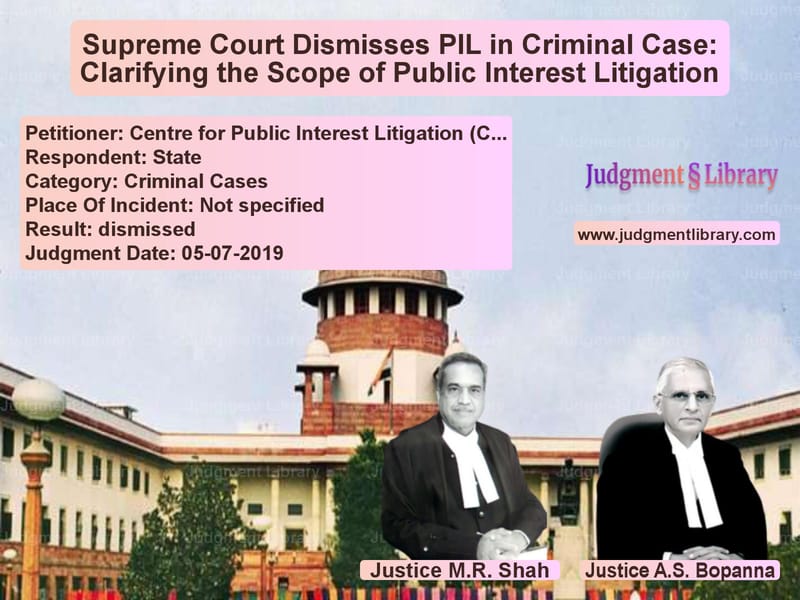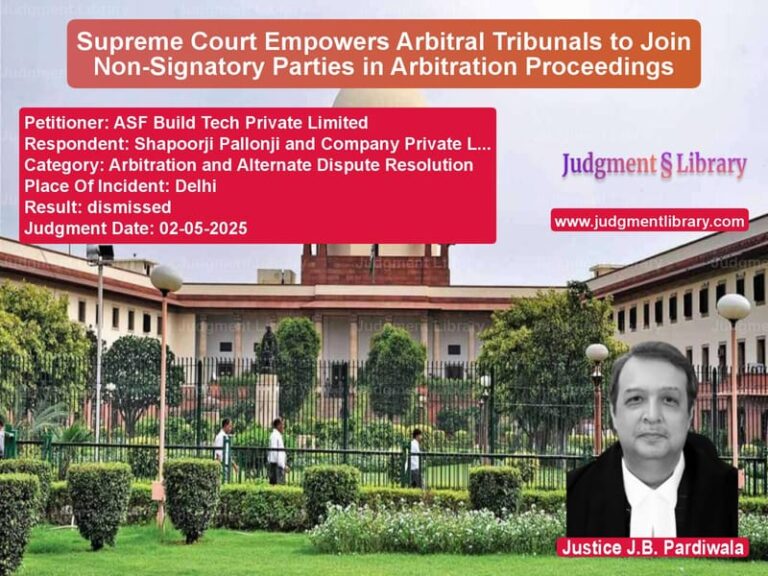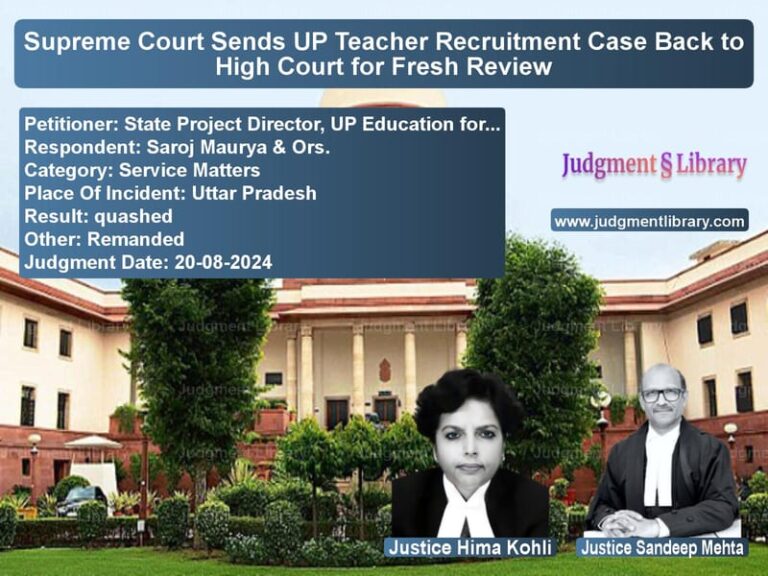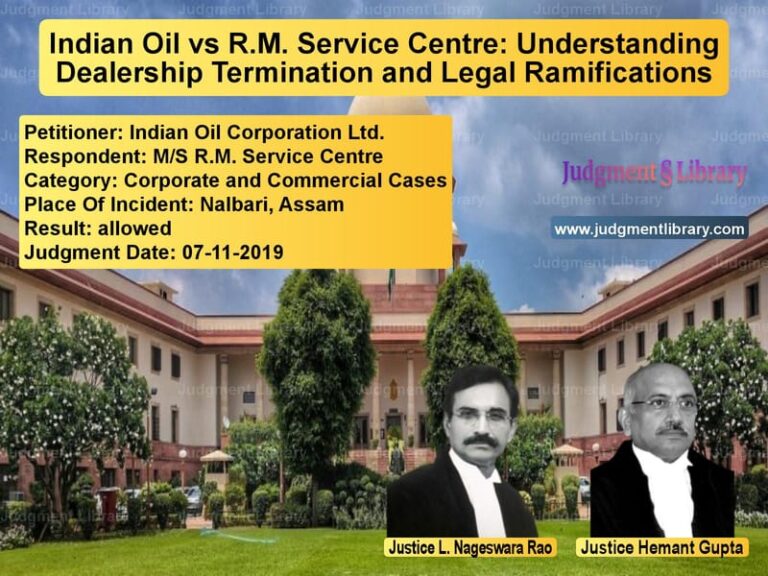Supreme Court Dismisses PIL in Criminal Case: Clarifying the Scope of Public Interest Litigation
The Supreme Court of India, in its ruling on 5th July 2019, addressed the misuse of Public Interest Litigation (PIL) in criminal cases. This case involved a PIL filed by the Centre for Public Interest Litigation (CPIL), urging the Court to re-investigate a criminal case that had already been adjudicated by the lower courts, including the highest appellate court. The Court dismissed the petition, reaffirming that PILs should not be used to undermine the judicial process and reopen closed cases.
Background of the Case
The PIL was filed by CPIL under Article 32 of the Indian Constitution, claiming that the investigation in the criminal case was flawed. CPIL argued that the prosecution failed to prove its case beyond a reasonable doubt and demanded a fresh investigation. The petitioner contended that the conviction was based on inadequate evidence and procedural irregularities.
The Supreme Court, in reviewing the petition, noted that the case had already gone through multiple levels of judicial scrutiny. The Court found that the grounds raised by CPIL were essentially an attempt to reopen a case already decided upon by the courts.
The Court made it clear that PILs cannot be used as a means to challenge judicial decisions that have already been concluded, particularly in criminal matters where all legal avenues have been exhausted.
Petitioner’s Arguments
- The prosecution’s case was flawed, with significant lapses in evidence collection and trial procedures.
- The conviction was based on insufficient evidence and procedural violations.
- An independent investigation was necessary to ensure justice was done.
However, the Court rejected these claims, pointing out that the merits of the prosecution’s case had already been examined in prior appeals and found to be sound. The Court also reiterated that PILs should not be used to re-litigate matters that have already been settled through the established judicial process.
Respondent’s Arguments
- The PIL was an abuse of the judicial process and a tactic to reopen a case that had already been fully adjudicated.
- All available legal remedies had been exhausted by the accused, and they had failed to convince the appellate courts of their innocence.
- The PIL was filed at the behest of the accused and was not intended to serve the public interest.
The Court agreed with the respondent’s arguments and emphasized that PILs should only be filed in cases that involve genuine public interest, not to subvert established legal procedures.
Court’s Final Decision
The Supreme Court dismissed the PIL, making the following observation:
“Accused persons were instrumental in getting this writ petition filed for further investigation in the case. If the accused so wanted, they ought to have approached this Court by filing an appropriate application in the criminal appeals only, and not through a PIL.”
The Court also clarified that individuals who have exhausted their legal remedies should not resort to PILs to challenge their convictions. It noted that the accused had competent legal representation and had every opportunity to contest the charges in the trial and appellate courts.
Key Takeaways from the Judgment
- PILs should not be used to challenge criminal convictions after all available legal appeals have been exhausted.
- The Supreme Court will not entertain PILs filed to reopen cases that have already been settled by the courts.
- The judgment reinforces the importance of adhering to established legal procedures and appellate processes in criminal trials.
- The Court strongly cautioned against the misuse of PILs as a tool for individuals who have a vested interest in manipulating the legal system.
Conclusion
This judgment is a critical reminder that PILs must serve genuine public interest and not be used as a backdoor to challenge settled criminal cases. The ruling ensures that PILs remain a tool to address public grievances, rather than a mechanism to revisit judicial decisions that have been thoroughly examined through established legal processes. The Court’s decision underscores the importance of upholding the integrity of the criminal justice system.
Petitioner Name: Centre for Public Interest Litigation (CPIL).Respondent Name: State.Judgment By: Justice M.R. Shah, Justice A.S. Bopanna.Place Of Incident: Not specified.Judgment Date: 05-07-2019.
Don’t miss out on the full details! Download the complete judgment in PDF format below and gain valuable insights instantly!
Download Judgment: Centre for Public In vs State Supreme Court of India Judgment Dated 05-07-2019.pdfDirect Downlaod Judgment: Direct downlaod this Judgment
See all petitions in Bail and Anticipatory Bail
See all petitions in Fraud and Forgery
See all petitions in Custodial Deaths and Police Misconduct
See all petitions in Judgment by Mukeshkumar Rasikbhai Shah
See all petitions in Judgment by A. S. Bopanna
See all petitions in dismissed
See all petitions in supreme court of India judgments July 2019
See all petitions in 2019 judgmentsSee all posts in Criminal Cases Category
See all allowed petitions in Criminal Cases Category
See all Dismissed petitions in Criminal Cases Category
See all partially allowed petitions in Criminal Cases Category







